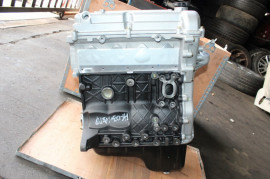An Extensive Comparison of Various Types of Import Engines and Their Applications in Numerous Cars
From the performance of turbocharged engines to the environmental kindness of electrical powertrains, the range of import engines offered in today's market provides to a large selection of driving choices and requirements. Whether it's the torque of a diesel engine or the unique style of a rotating engine, understanding the subtleties of each kind and how they straighten with certain car demands can considerably impact performance, gas economic situation, and overall driving experience.
Turbocharged Engines
Turbocharged engines, recognized for their ability to improve power result successfully, have become progressively prevalent in modern-day automobile designs. By making use of exhaust gases to drive a generator that compresses incoming air into the engine, turbochargers properly enhance the quantity of air and fuel mixture that can be ignited, leading to improved performance without considerably increasing engine dimension. This technology permits suppliers to scale down engines, bring about better gas performance while keeping power degrees comparable to bigger, naturally aspirated engines.

Crossbreed Engines
With the innovations in engine technology facilitating enhanced efficiency and effectiveness, the auto industry has seen an increase in the integration of crossbreed engines as a lasting option for power distribution. Crossbreed engines incorporate the benefits of both internal combustion engines and electrical motors to give improved fuel effectiveness and minimized exhausts. By flawlessly switching between the two power sources or using them all at once, hybrid engines provide adaptability in numerous driving problems.

Additionally, hybrid innovation is not limited to a particular vehicle type, with applications ranging from compact sedans to larger SUVs and even high-performance sports cars. As environmental concerns and fuel effectiveness guidelines end up being progressively famous, hybrid engines represent a significant step in the direction of sustainable transportation remedies.
Electric Engines
Electric engines have actually reinvented the automobile market with their environmentally-friendly and reliable power distribution systems. import engines. These engines run by converting electrical energy right into power, using a silent and smooth driving experience. Unlike traditional burning engines, electrical engines create absolutely no tailpipe exhausts, reducing the general carbon read review footprint of vehicles and assisting fight air pollution
Among the crucial advantages of electric engines is their high energy effectiveness, generally converting over 80% of the electric energy into propulsion. This performance translates right into expense savings for consumers through lowered fuel expenditures. Additionally, electrical engines need less upkeep contrasted to inner burning engines, as they have less moving components that can break over time.
Electric engines are typically made use of in electric cars (EVs) and crossbreed electrical cars (HEVs) EVs count entirely on electric engines for propulsion, drawing power from rechargeable batteries. On the various other hand, HEVs integrate electrical engines with traditional internal combustion engines to maximize fuel effectiveness and reduce exhausts. The adaptability and sustainability of electric engines make them an appealing service for the future of transportation.
Diesel Motor
Diesel motor are renowned for their phenomenal gas performance and robust efficiency in a variety of automotive applications. These engines run by compressing air in the cylinders, which leads to heats that spark the injected diesel gas without the requirement for ignition system. This combustion technique offers diesel engines with higher torque outcomes contrasted to gas engines, making them excellent for heavy-duty vehicles like trucks, buses, and building and construction devices.
Among the key advantages of diesel engines is their superior gas performance, as they can take a trip farther on a gallon of gas compared to fuel engines. This performance is specifically valuable for long-haul transportation and business fleets, where reducing fuel prices is a substantial element. Additionally, diesel motor are understood for their resilience and durability, requiring less upkeep over their lifespan compared to gas engines.
In recent years, innovations in diesel engine modern technology have also concentrated on minimizing emissions to fulfill rigorous ecological guidelines. Modern diesel engines are equipped with sophisticated discharges control systems, such as diesel particle filters and careful catalytic reduction, which assist decrease contaminants released into the ambience - import engines. These advancements have actually made diesel engines cleaner and more environmentally friendly while preserving their efficiency and efficiency characteristics
Rotary Engines
Prominent for their unique design and performance features, rotary engines use a distinctive option to conventional combustion engine technologies like diesel engines. These engines, likewise known as Wankel engines, operate on a different principle contrasted to traditional piston engines.

Conclusion
Finally, the comparison of various sorts of import engines highlights the variety of options offered for different automobiles. Turbocharged engines offer increased power and efficiency, crossbreed engines combine electrical and conventional power resources for boosted fuel economic climate, electric engines supply a clean and sustainable alternative, diesel motor are recognized for their toughness and torque, and their website rotary engines provide an unique layout with capacity for high performance. Each engine type has its own toughness and applications in the automotive market.
Furthermore, hybrid engines add to a quieter driving experience and usually provide a smoother acceleration contrasted to standard interior combustion engines.
Renowned for their special layout and performance characteristics, rotary engines supply an unique option to conventional combustion engine technologies like diesel engines. These engines, additionally recognized as Wankel engines, operate on a various concept compared to conventional piston engines. Regardless of these constraints, rotating engines proceed to draw in fanatics and suppliers looking for a various engine modern technology with distinctive advantages.
Turbocharged engines offer enhanced power and effectiveness, hybrid engines incorporate typical and electric power sources for enhanced gas economic climate, electrical engines supply a clean and lasting alternative, diesel engines are understood for their resilience and torque, and rotating engines offer a special style with potential for high efficiency.